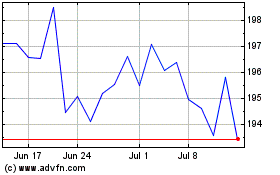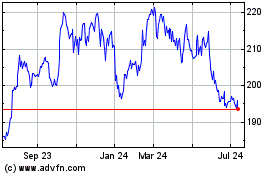Some CFTC Officials Wary Of Any Shift In Flexible Oversight Regime
November 18 2010 - 4:10PM
Dow Jones News
Senior U.S. futures regulators have voiced concerns that the
flexible oversight regime used over the past decade is being eroded
by a broad financial overhaul.
They say provisions in the Dodd-Frank law are causing the
Commodity Futures Trading Commission to shift away from being a
more business-friendly, principles-based regulator.
Such a shift could make the CFTC become more like the Securities
and Exchange Commission, where prescriptive rules govern exchanges
and other market participants, a less flexible regulatory
approach.
"Not everything will conform to a one-sized-fits-all solution,
and I'm wary we might be headed down that way," CFTC Commissioner
Scott O'Malia said in a recent interview.
The SEC's regulatory philosophy prescribes strict rules for
exchanges. The CFTC, by contrast, gives exchanges flexibility in
how they comply with various core principles. The CFTC boasts its
approach helps foster innovation and reduces industry costs. It has
enabled futures exchanges to get rule changes or new product
approvals faster than their securities exchange counterparts.
The Dodd-Frank law's impact on the CFTC comes as the
principles-based approach to financial regulation is being peeled
back around the world.
The new U.K. government is scrapping the Financial Services
Authority, a super-regulator set up in 1997 whose principles-based
approach was widely copied around the world. The FSA, however, was
criticized for its handling of the financial crisis.
The overhaul of U.S. futures regulation in 2000 took part of its
lead from the U.K. approach, and advocates of principles-based
oversight maintain it fostered industry growth and helped the
sector have a "good" crisis, handling the fallout from the Lehman
Brothers' collapse and subsequent market volatility.
The contrast between the CFTC's approach and the rules-based
oversight of the SEC has often been cited as the key barrier to any
merger of the agencies.
Any move away from principles is being eyed warily as the CFTC
negotiates closer cooperation with the SEC as they prepare to share
oversight of the massive over-the-counter derivatives market.
"I will ask that staff continue to follow our principles-based
regime and forego prescriptive rules," CFTC Commissioner Michael
Dunn said at a public meeting last month.
In a series of recent public statements, CFTC Commissioners
O'Malia, Dunn and Jill Sommers have all expressed fears that the
CFTC may become less lenient in how it allows market players to
comply with federal derivatives regulations. They have raised these
concerns as the CFTC continues to propose new, and at times
prescriptive, derivatives rules such as limits on clearinghouse
voting stakes and restrictions on how futures brokers can invest
their customers' collateral. The investment restrictions proposal
isn't required under Dodd-Frank, but comes in response to the
financial crisis after the Reserve Primary Fund "broke the
buck."
The Dodd-Frank law still preserves the core principles, leaving
exchanges and clearinghouses with some discretion over compliance
matters. A caveat was added, however. The law says exchanges have
discretion unless the CFTC hasn't otherwise prescribed a rule.
"In essence, if the CFTC chooses to be completely rules-based,
it can do so," Sommers said in a speech on Oct. 21.
Dunn has said he is concerned a lack of funding and resources
could force the agency to write more prescriptive rules because the
CFTC won't be able to enforce them without help from industry
self-regulatory groups. The CFTC has asked for a large budget
increase to implement Dodd-Frank, but so far hasn't received
it.
"Without sufficient staff to conduct proper oversight, the CFTC
may need to write more prescriptive rules that rely more heavily on
burdensome reporting requirements," Dunn said on Oct. 26. "This
will undoubtedly be very costly for the industry and market
users."
Despite some concerns voiced by regulators, however, some top
futures executives appear less concerned. Craig Donohue, chief
executive of CME Group Inc. (CME), said he thinks Congress left the
principles-based regulatory structure more or less intact when it
passed Dodd-Frank.
"People might have differences of opinion as to what constitutes
a principle versus what constitutes a rule," Donohue said. "In some
cases it may it lean more further toward the latter, but
fundamentally it hasn't altered what Congress intended."
-By Sarah N. Lynch, Dow Jones Newswires; 202-862-6634;
sarah.lynch@dowjones.com
(Doug Cameron and Jacob Bunge contributed to this article).
CME (NASDAQ:CME)
Historical Stock Chart
From Jun 2024 to Jul 2024

CME (NASDAQ:CME)
Historical Stock Chart
From Jul 2023 to Jul 2024
